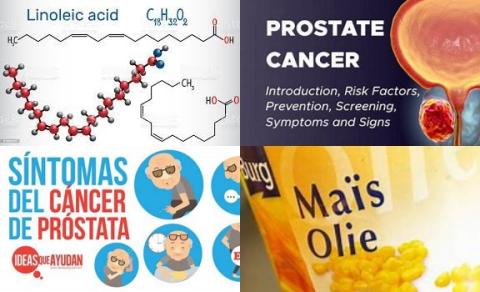
Objectives:
Findings on the association of dietary intake and tissue biomarkers of linoleic acid (LA) with the risk of prostate cancer are conflicting. Also, no meta-analysis summarized available findings in this regard. Therefore, this review article has been conducted.
Do higher tissue levels or higher dietary intakes of linoleic acid reduce prostate cancer risk in men?
Study design:
This review article included 15 prospective cohort studies with 511,622 participants with an age range of ≥18 years.
During the follow-up periods ranging from 5 to 21 years, 39,993 cases of prostate cancer, 5,929 cases of advanced prostate cancer and 1,661 cases of fatal prostate cancer were detected.
Results and conclusions:
The investigators found higher tissue levels of linoleic acid were significantly associated with a reduced risk of 14% for prostate cancer [RR = 0.86, 95% CI = 0.77 to 0.96].
However, a significant association was not seen for advanced prostate cancer [RR = 0.86, 95% CI = 0.65 to 1.13].
The investigators found in dose-response analysis, each 5% increase in tissue levels of linoleic acid was significantly associated with a 14% lower risk of prostate cancer.
The investigators found no significant association between dietary intake of linoleic acid and risk of total [RR = 1.00, 95% CI = 0.97 to 1.04], advanced [RR = 0.98, 95% CI = 0.90 to 1.07] and fatal prostate cancer [RR = 0.97, 95% CI = 0.83 to 1.13].
Not significant because RR of 1 was found in the 95% CI of 0.83 to 1.13. RR of 1 means no risk/association.
The investigators concluded higher tissue levels of linoleic acid reduce prostate cancer in men.
Original title:
Dietary intake and biomarkers of linoleic acid and risk of prostate cancer in men: A systematic review and dose-response meta-analysis of prospective cohort studies by Yousefi M, Eshaghian N, […], Sadeghi O.
Link:
https://pubmed.ncbi.nlm.nih.gov/37077161/
Additional information of El Mondo:
Find more information/studies on linoleic acid and prostate cancer right here.
Tissue levels of linoleic acid can be increased by eating foods that are high in linoleic acid and/or taking linoleic acid supplements.
Sunflower oil, corn oil, soybean oil, rice bran oil, canola (rapeseed) oil are high in linoleic acid.